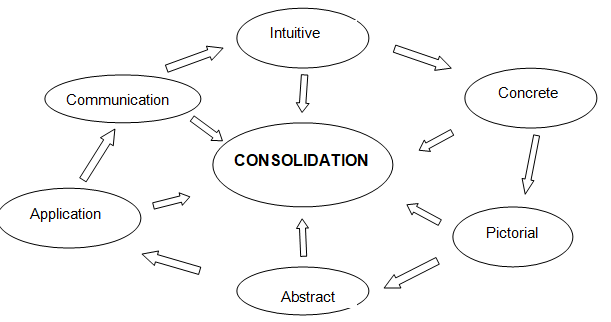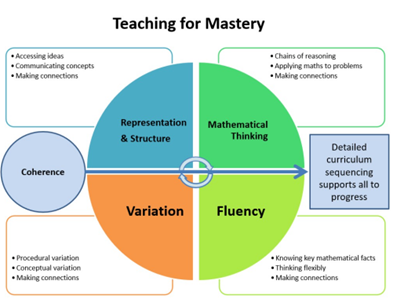Maths
Welcome to the Maths page!
In a world where number, measurement, geometry and statistics skills are needed in everyday life, we aim to teach all our children vital mathematical skills needed to problem solve and reason. Mathematical knowledge is critical for many subjects including science, technical engineering, computing and is needed in all forms of employment.
At Richard Hill, we recognise that thinking logically and approaching daily problems with perseverance is the key to mastering the National Curriculum. Through the teaching of progressive concrete, pictorial and abstract methods, using the White Rose and Mastering Number Schemes, our children develop a secure understanding of the number system enabling them to become inquisitive, investigative young people who enjoy being challenged. The purpose of this policy is to explain how the school intends to make this provision.
Rationale

Our school believes:
There is ‘an order that information presented mathematically is processed and learned’.
‘This hierarchy of learning can in turn offer a structure for teachers to follow. Sharma’s research (1990) proposes the following order as effective for the teaching of mathematics to pupils, which requires consolidation at all levels.’
Levels of Learning in Mathematics; NCTEM (2019)
We also believe:
‘Mastery has implications for working memory and long-term memory. The more the basics are practised, the more secure the links with underlying principles. The mastery curriculum in maths is also underpinned by reasoning and there are compelling reasons why reasoning should underpin other aspects of the curriculum as well. Reasoning calls on us to justify, to explain and to make clear our rationale for doing something. It draws on both working and long term memory and supports its nature.’
Mary Myatt; 2018
Therefore, Richard Hill’s Maths curriculum is designed around the Mastery Approach. Using the NCETM and Maths Hub research into “The Five Big Ideas”, and the EEF’s research into improving Mathematics in Key Stage 1 and Key Stages 2 and 3, we have created an agreed lesson structure to ensure all parts of the teaching for mastery diagram is embedded into our teaching.

The Five Big Ideas; NCETM (2017)
See appendix 1 in our Maths Policy for Richard Hill’s “Agreed Lesson Structure”
Aims:
The school’s aims are to:
- Teach progressive concrete, pictorial and abstract methods to enable all children, including those with SEND or disadvantaged backgrounds, to become fluent in key mathematical concepts
- Challenge our children’s thinking through rich and sophisticated problems so they are able to reason, find generalisations and proof
- Meet the requirements of the national curriculum programme of study for maths
- Strengthen our children’s long-term memory by following planning which provides spaced, interleaved and retrieval practice in line with our T&L policy and CUSP curriculum
- Embed children’s communication and problem-solving skills into the wider curriculum
- Foster a sense of enjoyment and enthusiasm for the nature of mathematics to ensure children continue to develop and master concepts later in life
- Ensure children with mathematical proficiency are celebrated
At Richard Hill, we follow the National Curriculum for mathematics to ensure that all pupils:
- Become fluent in the fundamentals of mathematics, including through varied and frequent practice with increasingly complex problems over time, so that pupils develop conceptual understanding and the ability to recall and apply knowledge rapidly and accurately
- Reason mathematically by following a line of enquiry, conjecturing relationships and generalisations, and developing an argument, justification or proof using mathematical language
- Can solve problems by applying their mathematics to a variety of routine and non-routine problems with increasing sophistication, including breaking down problems into a series of simpler steps and persevering in seeking solutions
INTENT
The mathematics curriculum offers the opportunities for children to develop their learning behaviours, in line with our Six Strands:
Boundaries: I respect others reasoning, share resources with peers, cope when I get an answer wrong and ask for help when needed.
Resilience: I can cope when I get an answer wrong, ask for help when needed and listen to respond to feedback to improve my learning.
Focus: I can follow and carry out instructions given to me and remain on task.
Respect: I can prepare and tidy away independently, use equipment safely and always be respectful of my working environment.
Self-Regulation: I can calmly work my way through problems, accept when I have made a mistake and respond appropriately during lessons.
Independence: I am eager to learn, can start and finish my word independently and know how to use the resources and environment for support.
As stated in our Teaching and Learning Policy, teachers use “Responsive Teaching” techniques such as questioning, retrieval practice and effective feedback to assess if learning has stuck or if teaching needs to be adapted to meet need.
Times Table Rock Stars - Numbots - Multiplication and Number Fluency
We use Times Table Rock Stars (TTRS) to support fluency with multiplication facts that really support children's develop in Maths. This supports classes with daily multiplication support in school but is also a great way to support children with learning at home.
In EYFS we use Numbots which is similar to TTRS but helps develop early number knowledge such as substising, number bonds and early calculation work. Again, this is used frequently in school but we encourage children to access it at home for additional practice.

Practice should be short and sweet! A “little and often” approach; 3 minutes practice a day, 4 or 5 times a week is a good target.
For more information or support with logging in please speak with your class teacher.
- TTRS parent information.pdf
- NumBots launch letter.pdf
- NumBots launch parent guide.pdf
- MathsHelpGuide.pdf
What is Times Tables Rock Stars? Parents and Carers Guide
In either paper form or online, Times Tables Rock Stars is a carefully sequenced programme of daily times tables practice. This format has very successfully boosted times tables recall speed for hundreds of thousands of pupils over the last 8 years in over 16,000 schools - both primary and secondary - worldwide.

